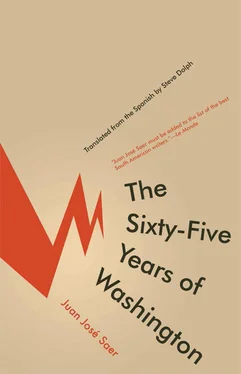Juan José Saer - The Sixty-Five Years of Washington
Здесь есть возможность читать онлайн «Juan José Saer - The Sixty-Five Years of Washington» весь текст электронной книги совершенно бесплатно (целиком полную версию без сокращений). В некоторых случаях можно слушать аудио, скачать через торрент в формате fb2 и присутствует краткое содержание. Год выпуска: 2010, Издательство: Open Letter, Жанр: Современная проза, на английском языке. Описание произведения, (предисловие) а так же отзывы посетителей доступны на портале библиотеки ЛибКат.
- Название:The Sixty-Five Years of Washington
- Автор:
- Издательство:Open Letter
- Жанр:
- Год:2010
- ISBN:нет данных
- Рейтинг книги:3 / 5. Голосов: 1
-
Избранное:Добавить в избранное
- Отзывы:
-
Ваша оценка:
- 60
- 1
- 2
- 3
- 4
- 5
The Sixty-Five Years of Washington: краткое содержание, описание и аннотация
Предлагаем к чтению аннотацию, описание, краткое содержание или предисловие (зависит от того, что написал сам автор книги «The Sixty-Five Years of Washington»). Если вы не нашли необходимую информацию о книге — напишите в комментариях, мы постараемся отыскать её.
The Sixty-Five Years of Washington — читать онлайн бесплатно полную книгу (весь текст) целиком
Ниже представлен текст книги, разбитый по страницам. Система сохранения места последней прочитанной страницы, позволяет с удобством читать онлайн бесплатно книгу «The Sixty-Five Years of Washington», без необходимости каждый раз заново искать на чём Вы остановились. Поставьте закладку, и сможете в любой момент перейти на страницу, на которой закончили чтение.
Интервал:
Закладка:
The Mathematician has already heard this story from Botón, the previous Saturday, on the bench at the stern, and even from such a dubious source that version had seemed more plausible, or in any case more elegant, than Tomatis’s: according to Botón, as we were saying, or rather yours truly was saying, just now, according to Botón, I was saying, no? Gabriel Giménez had in fact arrived in a taxi at four in the morning, animated no doubt by the little packets of coke, and according to Botón, according to Giménez himself, after three consecutive nights without sleep — a frequent thing in the case of Giménez, of Botón, and above all, in the case of Tomatis and, in Tomatis’s case, oftentimes in the company of Giménez himself, who never leaves his side — which means, the Mathematician thinks, that Tomatis should observe some basic rules, for example abstaining from scorning others for something that he treats so indulgently in himself. And, according to Botón, Giménez not only hadn’t disturbed the party with his condition, but rather had added, with his innate delicacy and sincere love for Washington, that in normal circumstances Tomatis would be the first to acknowledge, a pinch of salt to the event: to stay with Botón, Gabriel approached Washington and, undertaking a series of slow and genteel genuflections, in which all present could recognize a superior manner, and employing a gesture resembling the offering of the Eucharist, presented Washington with the little packet of coke, a kind of oblong, precious host that Washington, flattered by the distinction that the offer implied, declined with a polite smile and a quick pat on Giménez’s cheek, contending to not hold communion with that sect but at the same time declaring himself a supporter of religious tolerance.
— Right, says the Mathematician. Botón told me about it.
Tomatis doesn’t seem to hear him. They have reached the corner: a backup of cars and buses cutting each other off fills the intersection, caused by the street becoming pedestrian-only, so that the cars coming from the north are forced to turn at the cross street, and the ones coming up the cross street can only continue straight or turn to the north. Every so often a car horn connotes, through the artificial production of what they call conventional sound waves, someone’s impatience and, you could say, the nervous excitement of the drivers, which, added to the authoritarian but inconsequential whistles and arm gestures of a traffic agent standing on a platform, and the general sound of the city, where the nearest and most differentiated noises stand out, add several unforeseen variables to the ideal scheme of periodic intersections as conceived by Hippodamus. Leto, Tomatis, and the Mathematician disperse, adopting independent strategies for crossing, by sizing up, detouring, advancing, and retreating around the motionless cars, and when they reach the other side, almost at the same moment, they resume the initial order, highest to lowest, and continue walking together, this time in the middle of the street, cleared, for several blocks and several hours, of every kind of vehicle — Tomatis in the middle, immune to the circumspect silence of his company, to the somewhat desolate reticence his startling and unpleasant story is generating, and, blinded by the menace’s bitter compulsion, continues: No, the truth is it was not a good idea to invite all those people, and many of them, meanwhile, had no right to be there; they should have done something more intimate, with his real friends, the ones who, when Washington turns around, aren’t in the habit of punching him in the back of the head: Pirulo, for example, who thinks he has the right to look down on Washington because he’s not a member of the superstitious cult of quantitative sociological criteria, or Cuello the Centaur, who now pretends to be one of his closest friends, but in ’49 when the Peronists, in order to politically neutralize Washington for demanding that all the power should belong to the people, had him locked up in an asylum, Cuello, who was one of the youth leaders then, had washed his hands of it; and still, he, Tomatis, no? isn’t sure that Cuello wasn’t up to his teeth in the machinations. You could say the same of Dib, who, when he was director of the Center for Philosophy Students in Rosario, invented a political pretext for boycotting a conference that the Cohens had organized for Washington that was intended to mitigate his poverty because his pension hadn’t been paid for a year — and Dib’s true vocation and philosophical rigor can be understood, Tomatis says, when you stop to consider that he, Dib, in whose mouth the word idealist is the worst possible insult, the moment he finished spending the money his father left him, dropped out and went back to the city in order to open a mechanics shop, calculating — while calling himself a Marxist — that the main advantage of a mechanics shop is that it can operate, like the oligarchy’s plantations, with very little personnel. In any case, Tomatis says, having been the director of the Center for Philosophy Students is already proof enough of his vocation as a slave trader, because among the habits of those gentlemen is sending the troops to the front during a demonstration while reserving their spots in the hierarchy. No, frankly, there were several too many that night. And several who weren’t there who should have been.
Leto gives him a discreet, sidelong, glance, to see whether that last sentence had been intended to make up for not having invited him, but Tomatis’s pale profile does not alter when his gaze grazes it. From the other side, the Mathematician, whose attention was also caught by the sentence, concludes fundamentally that, almost certainly, the sentence is directed to his listeners, not because the absence of his listeners at the birthday party seemed a major injustice, but because, in order to mitigate the malevolence of his discourse somewhat, Tomatis strokes — without deliberately meaning to — the vanity of his listeners in order to compensate for the blackness of his descriptions. Tomatis’s pause seems to confirm this, and in a discreet but no less peremptory way, exploiting the caesura, the Mathematician ventures to suggest: Aren’t you exaggerating a little? Certainly Botón’s version isn’t altogether trustworthy, especially when he tries, instead of sticking circumspectly to the facts, to season it with his own interpretations, but from what he — the Mathematician, no? — knows about the people present, it seems that, ultimately, Botón’s version, leaving aside a few fantasies, probably doesn’t stray too far from the truth. And lastly, Tomatis’s psychological characterizations — here the Mathematician tries in vain to share a quick look of complicity with Leto over Tomatis’s head — if not unjust or incorrect in certain cases, seem to him secondary at best: You say that Botón is a lush? A gold star for that news! That Pirulo’s conceptions are among the most limited and that Cohen is always clouding his with rudimentary psychology? They’ve already agreed on that twenty times. No; from what Botón told him, the draw of the party wasn’t in those banalities, but in the discussion over Noca’s horse and Washington’s three mosquitos. Ending his circuit, the Mathematician, without even looking at Tomatis, puts his empty pipe in his mouth and, not inclined to making any more concessions, waits for a response.
— Noca’s horse, Noca’s horse, the three mosquitos. . Oh right! Now I remember, Tomatis concedes little by little, pretending to have to rummage deep in his memory in order to manifest those insignificant details. And he adds, exaggerating his skepticism, Yes, yes. Possibly.
Although, in his opinion, you have to be careful. If they were to try, for once, to be rigorous, there would be objections to spare: first off, whether or not Noca’s horse stumbled is something ultimately unverifiable, given that Noca’s fabulations are well-known up and down the coast, from the city all the way to San Javier and even farther north, and his reasons for constructing them — pragmatic or artistic as were the case — but always inspired by wine, are infinite in variety, resulting in a high probability of discussing something that never happened. Furthermore, if he remembers correctly, Noca had offered this explanation to Basso, the owner of the house, to account for his delay with the fish, an explanation that was rooted, as is well-known and beyond discussion, in his total inability to deal with any sort of real criticism, something supposedly caused by his Orientalism — a subject which he barely understands and has hardly read about; and finally, if his memory serves, Cohen was the one who started the argument, while he prepared the fire, and everyone knows that Cohen has a particular tendency to propose problems that appear fundamental only in order to adopt subtle-seeming formulations and supposedly knowing expressions for explaining them; and all of this because Silvia, his wife, is smarter than him, something he endures with considerable pains. Furthermore , Tomatis adds before becoming thoughtful for a few seconds, you would have to decide if instinct, as he assumes, really is pure necessity.
Читать дальшеИнтервал:
Закладка:
Похожие книги на «The Sixty-Five Years of Washington»
Представляем Вашему вниманию похожие книги на «The Sixty-Five Years of Washington» списком для выбора. Мы отобрали схожую по названию и смыслу литературу в надежде предоставить читателям больше вариантов отыскать новые, интересные, ещё непрочитанные произведения.
Обсуждение, отзывы о книге «The Sixty-Five Years of Washington» и просто собственные мнения читателей. Оставьте ваши комментарии, напишите, что Вы думаете о произведении, его смысле или главных героях. Укажите что конкретно понравилось, а что нет, и почему Вы так считаете.












